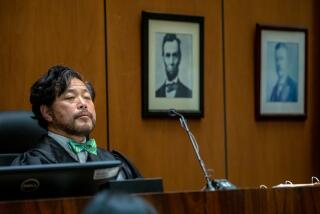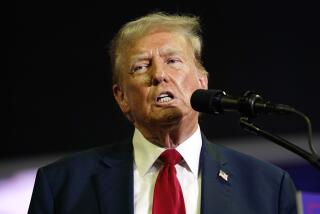Bryant Wins a Legal Battle
- Share via
Kobe Bryant’s legal team won a key battle Thursday to keep statements the Laker star made to investigators from being revealed to the public during a hearing that will determine whether the interrogation was legal.
Judge Terry Ruckriegle ruled that Bryant’s right to a fair trial would be jeopardized by public disclosure of the statements, which were made to two Eagle County sheriff’s officers just after midnight July 2, little more than 24 hours after prosecutors say the Laker star raped a 19-year-old woman who worked at a hotel.
Ruckriegle also decided that precautions would be taken to conceal the identities of three undercover officers who had Bryant under surveillance July 1. Those officers are scheduled to testify during the pretrial hearing Monday and Tuesday in Eagle County court.
However, other portions of the hearing will be open, including testimony from Bryant’s bodyguards and descriptions of his 60-mile taxi ride from the Lodge and Spa at Cordillera in Edwards, Colo., to Valley View Hospital in Glenwood Springs, where he provided DNA samples.
Bryant’s attorneys are trying to convince Ruckriegle that the interrogation should be suppressed because, they say, Bryant was “in custody” and therefore should have been read his Miranda rights. Under Colorado law, the definition of “in custody” is when a person no longer feels free to leave.
Bryant’s attorneys also contend that the search warrant used by officers was valid only during daytime; the interrogation was done at night.
According to sources close to the investigation, detectives Doug Winters and Dan Loya were successful in separating Bryant from his bodyguards before the interrogation began. Bryant was on crutches because he had undergone knee surgery July 1 in nearby Vail. Winters and Loya approached him in the hotel parking lot, said they had to talk to him alone, and took him to his room for questioning. Loya secretly taped the interview, which lasted 75 minutes.
Ruckriegle decided Bryant’s statements should be kept from the public during the suppression hearing over the objections of attorneys who represent a media group, including The Times. Prosecutors did not object to closing the hearing.
Bryant’s statements “include information which is personal, highly sensitive, clearly irrelevant to this case or subject to challenge as to relevancy and/or admissibility,” Ruckriegle wrote.
He also cited as precedent a case in which the judge wrote, “On occasion, one right must necessarily be subordinated to the other.... The interest of the accused, whose life and liberty are in jeopardy, to a fair trial by an impartial jury is paramount, and may require
The three undercover officers who will testify did not interrogate Bryant. Media attorneys agreed with the prosecution and defense that the detectives may testify in open court from behind a screen that will hide their identity.
More to Read
All things Lakers, all the time.
Get all the Lakers news you need in Dan Woike's weekly newsletter.
You may occasionally receive promotional content from the Los Angeles Times.







